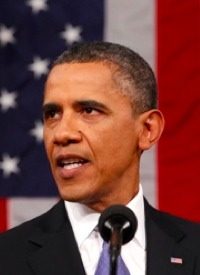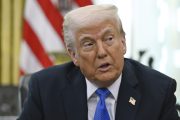
In the order, the National Defense Resources Preparedness Order, the President granted to himself the authority to approve the dispensing of all domestic energy, production, transportation, food, and water supplies as he deems necessary to protect national security.
Despite the national defense hurdle that ostensibly must be jumped in order for the order to take effect, the text of the document itself does not limit implementation to a time of war. In fact, the specific sections of the order make it clear that the President may take complete command and control of the country’s natural resources in peacetime, as well.
In fact, the President may invoke the powers of this order to “meet national defense requirements” in “the full spectrum of emergencies.” The relevant sections read:
Section 101. Purpose. This order delegates authorities and addresses national defense resource policies and programs under the Defense Production Act of 1950, as amended (the "Act").
Sec. 102. Policy. The United States must have an industrial and technological base capable of meeting national defense requirements and capable of contributing to the technological superiority of its national defense equipment in peacetime and in times of national emergency. The domestic industrial and technological base is the foundation for national defense preparedness. The authorities provided in the Act shall be used to strengthen this base and to ensure it is capable of responding to the national defense needs of the United States.
Sec. 103. General Functions. Executive departments and agencies (agencies) responsible for plans and programs relating to national defense (as defined in section 801(j) of this order), or for resources and services needed to support such plans and programs, shall:
(a) identify requirements for the full spectrum of emergencies, including essential military and civilian demand;
(b) assess on an ongoing basis the capability of the domestic industrial and technological base to satisfy requirements in peacetime and times of national emergency, specifically evaluating the availability of the most critical resource and production sources, including subcontractors and suppliers, materials, skilled labor, and professional and technical personnel;
The underlying legal authority for the execution of such a radical order is found in the Defense Production Act of 1950, the President claims. That law combined with the rights vested in him as Commander-in-Chief of the U.S. Armed Forces supposedly empowers the President to endow himself with these expansive powers.
Just how expansive are the claimed powers and what resources are included in their scope? Livestock? Yes. All food “resources” and “resource facilities?” Yes. Veterinary clinics? Yes. All forms of energy? Yes. Will the President control the water supply? Yes.
Read on:
Sec. 201. Priorities and Allocations Authorities.
(a) The authority of the President conferred by section 101 of the Act, 50 U.S.C. App. 2071, to require acceptance and priority performance of contracts or orders (other than contracts of employment) to promote the national defense over performance of any other contracts or orders, and to allocate materials, services, and facilities as deemed necessary or appropriate to promote the national defense, is delegated to the following agency heads:
(1) the Secretary of Agriculture with respect to food resources, food resource facilities, livestock resources, veterinary resources, plant health resources, and the domestic distribution of farm equipment and commercial fertilizer;
(2) the Secretary of Energy with respect to all forms of energy;
(3) the Secretary of Health and Human Services with respect to health resources;
(4) the Secretary of Transportation with respect to all forms of civil transportation;
(5) the Secretary of Defense with respect to water resources; and
(6) the Secretary of Commerce with respect to all other materials, services, and facilities, including construction materials.
(b) The Secretary of each agency delegated authority under subsection (a) of this section (resource departments) shall plan for and issue regulations to prioritize and allocate resources and establish standards and procedures by which the authority shall be used to promote the national defense, under both emergency and non-emergency conditions. Each Secretary shall authorize the heads of other agencies, as appropriate, to place priority ratings on contracts and orders for materials, services, and facilities needed in support of programs approved under section 202 of this order.
(c) Each resource department shall act, as necessary and appropriate, upon requests for special priorities assistance, as defined by section 801(l) of this order, in a time frame consistent with the urgency of the need at hand. In situations where there are competing program requirements for limited resources, the resource department shall consult with the Secretary who made the required determination under section 202 of this order. Such Secretary shall coordinate with and identify for the resource department which program requirements to prioritize on the basis of operational urgency. In situations involving more than one Secretary making such a required determination under section 202 of this order, the Secretaries shall coordinate with and identify for the resource department which program requirements should receive priority on the basis of operational urgency.
(d) If agreement cannot be reached between two such Secretaries, then the issue shall be referred to the President through the Assistant to the President and National Security Advisor and the Assistant to the President for Homeland Security and Counterterrorism.
(e) The Secretary of each resource department, when necessary, shall make the finding required under section 101(b) of the Act, 50 U.S.C. App. 2071(b). This finding shall be submitted for the President’s approval through the Assistant to the President and National Security Advisor and the Assistant to the President for Homeland Security and Counterterrorism. Upon such approval, the Secretary of the resource department that made the finding may use the authority of section 101(a) of the Act, 50 U.S.C. App. 2071(a), to control the general distribution of any material (including applicable services) in the civilian market.
That’s right. The last line of the quoted material gives the President of the United Staes the power to “control the general distribution of any material (including services) in the civilian market.” This seems to be no less than the nationalization of all food, energy, water, and healthcare pipelines and providers in the country. And to help him keep tabs on all this responsibility, he assigns a cabinet member to each category of control.
Presidents have issued similar orders in the name of national defense. For example, during the Civil War, President Abraham Lincoln famously (infamously) suspended habeas corpus and the right to an impartial trial as protected by the Sixth Amendment.
Then, during World War I, President Woodrow Wilson, frustrated with Congress’s reluctance to grant him a full panoply of power over natural resources, invoked the powers given him under an executive order to assume absolute and unilateral authority over the same range of resources as are included in President Obama’s latest fiat.
As any student of history can testify, when government begins to interfere with the free flow of goods and commodities (especially life-giving resources such as food and water), then it may manipulate the availability of these items, as well as the prices thereof. Typically, such fluctuations result in civil disturbances and a demand for greater security from those unwilling to abide by the new “laws.” And, in exchange for greater security, those clamoring for it are often willing to give up their fundamental freedoms.
The White House has issued no statement regarding the purpose for the signing of this Executive Order. There is no accompanying explanation of why this power should be placed before the President at this time — or at any time for that matter. Is it in place to prepare for expansion of the hostilities in the Middle East, or is it something to do with his vaunted algae initiative?
Perhaps the President is taking the first few steps necessary to cloak himself in the powers required to "legally" (albeit unconstitutionally) step outside the boundaries of his constitutional authority and ascend to a level of supervision witnessed in all the former republics of history just before their devolution into mobocracy and mayhem.
Photo of President Obama: AP Images




